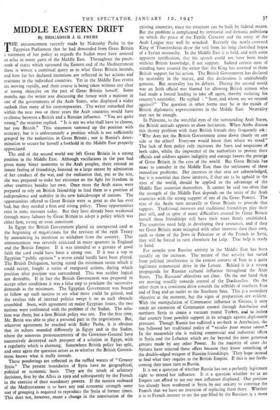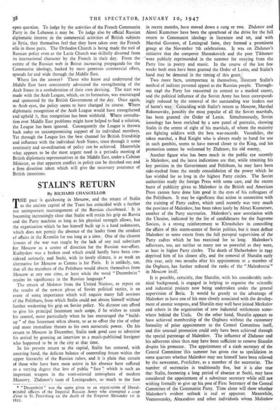MIDDLE EASTERN DRIFT
By BRIGADIER J. G. FRERE
THE announcement recently made by Nokrashy Pasha in the Egyptian Parliament that he had demanded from Great Britain a statement of her policy as regards the Sudan must have aroused an echo in many parts of the Middle East. Throughout the patch- work of states which surround the Eastern end of the Mediterranean there is woven a continual query as to what Great Britain intends, and how far her declared intentions are reflected in her actions and reactions in the individual countries. Yet in the Middle East events are moving rapidly, and their course is being taken without any clear or strong objective on the part of Great Britain herself. Some
months ago the writer was discussing the future with a minister in one of the governments of the Arab States, who displayed a wider outlook than many of his contemporaries. The writer remarked that within the next two or three years the Arab countries would have to choose between a British and a Russian influence. " You are quite wrong," the minister replied. " It is not we who shall have to choose, but you British." This statement summed up the position with accuracy, but it is unfortunately a position which is not sufficiently grasped by the authorities in Great Britain ; nor is Russia's deter- mination to secure for herself a foothold in the Middle East properly appreciated.
The end of the second world war left Great Britain in a strong position in the Middle East. Although vacillations in the past had given many bitter moments to the Arab peoples, there existed an innate feeling of friendship, fostered to a large extent by admiration of her conduct of the war, and the realisation that, put to the test, she was prepared to stake her existence on the fight for freedom in other countries besides her own. Once more the Arab states were prepared to rely on British friendship to lead them to a position of independence and stability in the new kaleidoscope of nations. The opportunities offered to Great Britain were as great as she has ever had, but they needed a firm and strong policy. Those opportunities exist in some measure today. But they have already been weakened through many failures by Great Britain to adopt a policy which was either firm, strong or even consistent.
In Egypt the British Government played an unexpected card at
the beginning of negotiations for the revision of the 1936 Treaty by announcing its intention to withdraw from the country. This announcement was severely criticised in many quarters in England and the British Empire. If it was intended as a gesture of good faith the card could have been a strong one. If it was a sop to Egyptian " public opinion " a worse could hardly have been played. The British Delegation, having stated the minimum terms which it could accept, fought a series of rearguard actions, during which position after position was surrendered. This was neither logical nor desirable. If in fact the British Government was prepared to accept other conditions it was a false step to proclaim the successive demands as the minimum. The Egyptian Government was bound to follow up each success to see what more could be gained, and the restless tide of internal politics swept it on as each obstacle crumbled. Soon, with agreement on major Egyptian issues, the two nations were confronted with the problem of the Sudan. The solu- tion was there, but a firm British policy was not. For the first time, Mr. Bevin was able to play a personal part in the negotiations. But, whatever agreement he reached with Sidky Pasha, it is obvious that its echoes sounded differently in Egypt and in the Sudan, where the sonorous pronouncements of the Governor-General have successively destroyed each prospect of a solution in Egypt, with a regularity which is alarming. Somewhere British policy has split, and once again the question arises as to whether the British Govern- ment knows what it really intends.
These ponderings are reflected in the ruffled waters of "Greater
Syria." The present boundaries of Syria have no geographical, political or economic basis. They are the result of arbitrary decisions, first by the Allies in 1919 and subsequently by the French in the exercise of their mandatory powers. If the eastern seaboard of the Mediterranean is to have any real economic strength some sort of grouping is required to reproduce the Syria of former times. This does not, however, mean a change in the constitution of the
existing countries, since the structure can be built by federal means. But the problem is complicated by territorial and dynastic ambitions on which the peace of the Fertile Crescent and the unity of the Arab League may well be wrecked. Recently the newly-crowned King of Transjordania drew the veil from his long cherished hopes of a Syrian monarchy. In the Middle East it is held, and with some apparent justification, that his speech could not have been made without British knowledge, if not support. Indeed certain men of standing have assured the writer that the King has asserted to them British support for his action. The British Government has declared its neutrality in the matter, and this declaration is undoubtedly genuine. But neutrality has its defects. During the second world war an Irish official was blamed for allowing British airmen who had made a forced landing to take off again, thereby violating his country's neutrality. He replied : " Sure, and whom are we neutral against?" The question in other forms may be in the minds of British diplomatic representatives in the Middle East. Neutrality may not be enough.
In Palestine, to the watchful eyes of the surrounding Arab States, the British attitude appears to show hesitation. When Arabs discuss this thorny problem with their British friends they frequently ask: " Why does not the British Government come down clearly on one side cr the other? Everyone would know then where we stood."
The lack of firm policy only increases the fears and suspicions of both sides, whilst the impotence of the authorities to protect their officials and soldiers against indignity and outrage lowers the prestige of Great Britain in the eyes of the world. But Great Britain has more to consider in the Middle East than the settlement of these immediate problems. Her interests in that area are acknowledged, but it is essential that those interests, if they are to be upheld in the eyes of the world, should be applied to the advantage of the Middle East countries themselves. It cannot be said too often that the strength of the Middle East depends on the unity of the Arab countries with the strong support of one of the Great Powers. The eyes of the Arabs turn naturally to Great Britain to provide that support. Traditional interests and traditional friendships play their part still, and in spite of many difficulties created by Great Britain herself those friendships still have their roots firmly established. The countries need help in developing their resources, and if they see Great Britain more occupied with other interests than their own, such as those of the Jews in Palestine or of the French in Syria, they will be forced to turn elsewhere for kelp. That help is ready to hand.
For months now Russian activity in the Middle East has been steadily on the increase. The nature of that activity has varied from political interference in the remote corners of Iran to a quite legitimate commercial drive in the Levant. Behind it is a strong propaganda for Russian cultural influence throughout the Arab States. The Russians' objectives are clear. On the one hand they are moving steadily towards control of the Dardanelles. On the other there is a consistent drive towards the oilfields of southern Iran and of Iraq and an outlet to the Southern Seas. This is a secondary objective at the moment, but the signs of preparation are evident. With the manipulation of Communist influence in Greece, it only needs an extension of Communist control through Azerbaijan and northern Syria to create a vacuum round Turkey, and to isolate that country from possible support in its struggle against.diplomatic pressure. Though Russia has suffered a set-back in Azerbaijan, she has followed her traditional policy of "reculer pour mieux saucer." In the meanwhile she is making commercial and industrial offers in Syria and the Lebanon which are far beyond the most generous gesture made by any other Power. In the majority of cases the Syrians have rejected these offers because they know something of the double-edged weapon of Russian friendships. They hope instead to find what they require in the British Empire. If this is not forth- coming they must turn to Russia.
It is not a question of whether Russia has not a perfectly legitimate right to extend her influence. It is a question whether we as an Empire can afford to see our own influence displaced. Our position has already been weakened in Syria by our anxiety to convince the French that we have no intention of replacing them there. Whether it is to French interest to see the gap filled by the Russians ig a more
open question. To judge by the activities of the French Communist Party in the Lebanon it may be. To judge also by official Russian diplomatic interest in the commercial activities of British subjects in Syria, they themselves feel that they have taken over the French role in those parts. The Orthodox Church is being made the tool of Russian policy even as the Latin Church was skilfully diverted from its international character by the French in their day. From the centre of the Russian web in Beirut increasing propaganda for the Communist ideology, backed by most generous commercial offers, spreads far and wide through the Middle East.
Where lies the answer? Those who know and understand the Middle East have consistently advocated the strengthening of the Arab States in a confederation of their own devising. The start was made with the Arab League, which, on its formation, was encouraged and sponsored by the British Government of the day. Once again, to Arab eyes, the policy seems to have changed its course. Where diplomatic recognition of the Arab League would have strengthened and upheld it, that recognition has been withheld. Where consulta- tion over Middle East problems might have helped to find a solution, the League has been ignored. Consequently the League is thrown back today on uncompromising support of its individual members. Yet through the League lies the best channel for British friendship and influence with the individual Arab States, since through it some continuity and co-ordination of policy can be achieved. Meanwhile what appears to be the most urgent need is a periodic meeting of British diplomatic representatives in the Middle East, under a Cabinet Minister, so that apparent conflict in policy can be threshed out and a firm direction taken which will give the necessary assurance of British intentions.



































 Previous page
Previous page